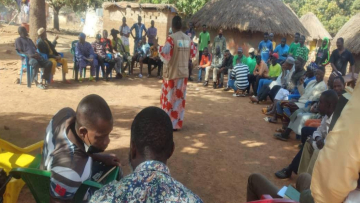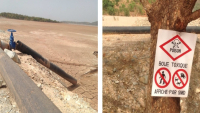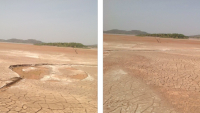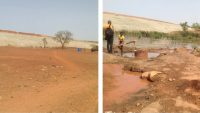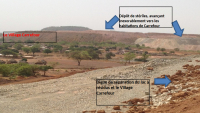Project – On record
This profile is no longer actively maintained, with the information now possibly out of dateBankTrack, Centre du Commerce International pour le Développement (CECIDE), Créativité et Développement (C-DEV) & Mêmes Droits pour Tous (MDT)
Giulia Barbos, giulia@banktrack.org
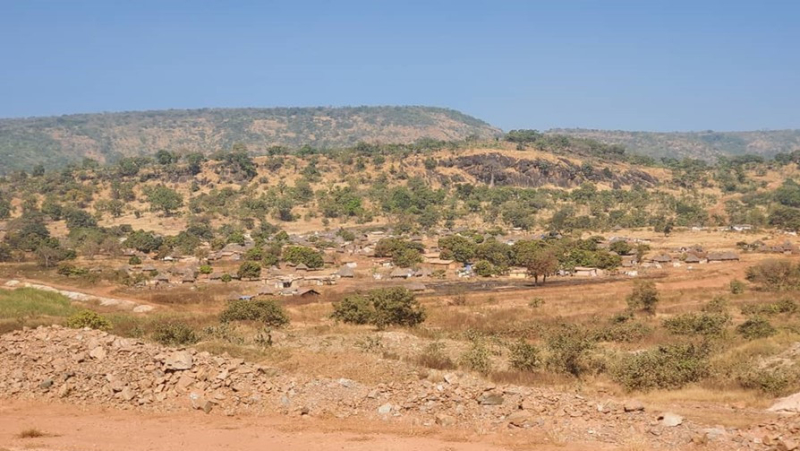
Project – On record
This profile is no longer actively maintained, with the information now possibly out of dateBankTrack, Centre du Commerce International pour le Développement (CECIDE), Créativité et Développement (C-DEV) & Mêmes Droits pour Tous (MDT)
Giulia Barbos, giulia@banktrack.org
Why this profile?
Since commercial production began at the site in 2008, the Lefa mine has had significant adverse impacts on local communities, and nearby residents of Carrefour village. These include air pollution, contamination of farmland and water sources, and damage to homes and other property. The mine continues to negatively impact the livelihoods of the Carrefour community, whose members wish to be relocated as soon as possible for their safety and wellbeing, but cannot reach agreeable terms with the company responsible for running the Lefa mine.
What must happen
Banks and other institutions providing finance to Nordgold - the company responsible for operating the Lefa mine - should exercise their leverage to ensure that it meaningfully consults with the affected community of Carrefour. It is the banks’ responsibility - as outlined in the OECD Guidelines and UN Guiding Principles - to carry out ongoing human rights due diligence and engage with their clients, to ensure the rights of local communities are respected. This also includes playing a role in the remediation of harms, and supporting measures such as safe relocation and adequate compensation.
| Sectors | Mining |
| Location |
|
| Status |
Planning
Design
Agreement
Construction
Operation
Closure
Decommission
|
| Website | https://www.nordgold.com/operations/production/lefa/ |
The Lefa mine is located approximately 700 km northeast of Guinea’s capital Conakry and is one of the largest gold producers in the country. The mine is fully owned by Société Minière de Dinguiraye S.A. (SMD). SMD is jointly owned by Russian mining company Nordgold, which holds a controlling interest of 85%, and the government of Guinea, which holds the remaining 15%.
Impact on human rights and communities
Impacts on livelihoods and wellbeing of local communities. Throughout the years, the Lefa mine has significantly impacted the livelihoods of local communities, for instance through the destruction and contamination of farmland. A 2019 Environmental Impact Assessment (ESIA) found that mining eroded the land of its nutrients and rendered it infertile for agricultural purposes. The degradation of land caused by the activities of the Lefa gold mine is a major threat to agriculture and the economic survival of communities that depend on it. Much of the land has also been contaminated with harmful chemicals. This not only impacted agricultural activities, but also increased the mortality rate and incidence of diseases. In fact, the mine’s activities often result in toxic metals being released in not just farmland, but also water and the air. This means that communities are exposed to a high risk of contracting respiratory infections and diseases.
Lack of access to clean and safe water. The Lefa gold mine has also impacted the quality of water, violating the communities’ right to clean and safe drinking water. The mine’s tailings, where waste is discharged, are located only a few hundred metres from the village of Fayalala Carrefour, where about 1700 people live. During the first half of July 2015, members of the Carrefour community faced a grave incident when the mine’s settling pond discharged onto a nearby lake used by the community for drinking, washing, and other purposes. Since then, access to clean and safe water has been difficult. In 2023, following two field visits, local NGOs asked the company to disclose water quality monitoring data to establish the current levels of water contamination. The company, however, is unwilling to disclose such information, resulting in the local communities not knowing if their water sources are contaminated or otherwise safe to use.
Labour issues. Local communities have raised concerns regarding poor working conditions at the mine site, including wrongful terminations and wage discrimination. Nordgold claims that the local workforce does not possess the necessary skills to work in the mine, and favours the hiring of foreign workers. A 2018 article revealed that since Nordgold's acquisition of the mine, many local workers have lost their jobs. The article also exposed the extremely dangerous conditions of workers and the wage differences between local and foreign employees at the mine site. More recently, in March 2023, NordGold was reportedly implicated in a labour dispute with the workers at its Lefa mine over working conditions.
Meaningful and safe rights-holders consultation. The residents of the Carrefour village have for years been asking to be relocated to a different area for their safety and wellbeing. The company, however, has been slow in its response, and has failed to meaningfully consult with them by refusing to consider the community’s views and needs on the terms of the relocation. The terms of the relocation were agreed between the two parties over a meeting in December 2020 establishing that all new housing units would be equipped with living rooms. However, following this meeting, the company unilaterally changed the building plans, citing a lack of funds, and removed living rooms from approximately 80% of planned housing units. Ever since, the community has been trying to raise this issue directly with the company, but all attempts have so far been unsuccessful.
Exclusion of women and other vulnerable groups from consultation and impacts on their rights. The resettlement process of the Lefa gold mine has had significant implications for women’s rights. During the consultation period, women and other vulnerable groups were completely left out of the process, at odds with international legal standards and the recommendations given by a group of consultants who were in charge of developing the resettlement plan for the Carrefour village. The company’s engagement with the residents of the Carrefour village primarily involved adult men, as evidenced by the data collected on-site. This exclusionary approach has resulted in a significant lack of representation and involvement for women, children, and even individuals with disabilities throughout the resettlement process, which poses a clear threat to the rights of these marginalised groups.
Impact on nature and environment
Biodiversity loss: Since the mine started operations, the variety of local animal and plant species have greatly diminished. According to a study, 24 plant species belonging to 13 families were identified at the Lefa mine site before it was active. Years after the mine started its activities, these species have become rare or have disappeared in the mine’s vicinity and surrounding villages. The mine’s activities have therefore severely disturbed the surrounding land, and have contributed to the destruction of natural ecosystems and vegetation. Furthermore, domestic animals owned by the communities have lost pasture to feed on.
Pollution and waste: At the Lefa mine, the process to extract gold is very hazardous and polluting because it involves the use of cyanide, a highly poisonous and potentially deadly chemical. When in contact with water, cyanide becomes a toxic gas, which pollutes the air. This has been a source of concern for many years, as the mine discharges its wastewater into a tailings lake, which is located only a few hundred metres from local villages. Mismanagement of the mine’s tailings has resulted in the lake - used by local communities as a water source - being contaminated by cyanide over repeated incidents. Furthermore, concerns about the tailings intensified in recent years, as its dykes are worn out and the lake continuously threatens to overflow. The risk of overspills remains high.
Impacts on soil erosion and agricultural land: The initial layers of soil, approximately 50 to 100 metres deep, in the mining area are transformed into sandy sediment during the blasting and transportation process. This sediment accumulates in waste rock piles surrounding the open pits, which experience rapid erosion. Consequently, nearby properties, including streams and cultivated fields, are affected by sediment runoff. The proximity of these piles to residential areas, such as Carrefour and the mine camps, poses risks to people during the rainy season. Garanke Mady's fields have suffered severe damage, rendering them unusable.
Impact on pandemics
The emergence of new infectious diseases: Mining operations can have various impacts on the environment, including changes to local ecosystems and wildlife habitats. These changes can increase the risk of zoonotic diseases, which are caused by pathogens that jump from animals to humans. When humans come into contact with wildlife in disrupted habitats, such as those impacted by mining, the risk of disease transmission can increase.
Banks are financing Nordgold via corporate loans and bonds issuance underwriting:
- In March 2019 Raiffeisen Bank, ING and Deutsche Bank financed a two year USD 100 million credit facility;
- In October 2019 Raiffeisen Bank, Intesa Sanpaolo, Mizuho, Alfa Bank and Société Générale financed a three year USD 100 million credit facility;
- In October 2019 Nordgold issued bonds totalling USD 400 million which were underwritten by eight banks. See below for more details on banks involved.
The Lefa gold mine is fully owned by Société Minière de Dinguiraye (SMD). SMD is jointly owned by Russian mining company Nordgold, which holds a controlling interest of 85%, and the government of Guinea, which holds the remaining 15%.
Nordgold
Russian FederationApplicable norms and standards
- Guinea Environmental Code 2019
- Guinea Mining Code

